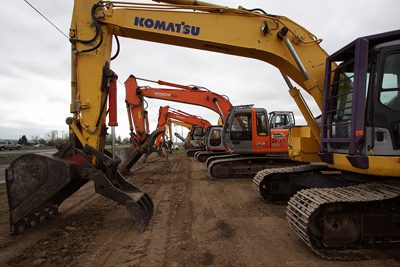Ritchie Bros. mulls auction facility here
Big industrial auctioneer to hold first Spokane event in 20 years next month

Ritchie Bros. Auctioneers Inc., of Vancouver, British Columbia, which claims to be the world's largest industrial auctioneer, says it plans to hold its first auction here in 20 years next month and, more significantly, is considering opening a Spokane auction facility.
The May 5 auction is to be held at 8600 W. Geiger Blvd., south of Spokane International Airport along Interstate 90, and will include construction, paving, aggregate, and transportation equipment, as well as hydraulic excavators and trailers, a notice on its Web site says.
Rob Giroux, Ritchie Bros.' Olympia, Wash.-based regional manager for the Northwest, Alaska, and Hawaii, says he expects the auction to be large.
"This area has tremendous potential," he says, referring to Spokane. "We have been greeted with wide open arms by our customers. I think, judging by the response we've gotten, we'd be able to do something more permanent sooner rather than later."
He declines to speculate on when the company might make a decision on whether to open a facility or to say where it might be located, other than that, "We like to have something with good highway exposure, and this fits the bill for now."
He says a permanent Spokane auction facility would need to be located on at least 30 acres, with building space for prepping auction equipment, and likely would be comparable to one the company operates in Boise. That facility is located at 4815 Market Street, on the south side of Boise, along Interstate 84 east of the Boise Airport.
"Boise is similar to what we foresee the Spokane area to be. We had a $6.8 million auction there yesterday (April 13), and there were attendees from all over the world," Giroux says. The company also allows registered participants to submit real-time bids over the Internet.
Ritchie Bros. already is well-known to industrial equipment owners and operators in the Spokane area, Giroux says. "We have a lot of consigners and customers in the area, and they typically will truck their equipment to our facility in Olympia," so holding a sale and possibly opening an auction facility in Spokane would be much more convenient for them, he says.
Ritchie Bros. employs about 35 people full time in the Northwest, "but when we conduct the sales we bring in quite a few folks to help put everything together," Giroux says.
The publicly traded company sells, through unreserved public auctions, a broad range of used and new equipment for the construction, transportation, agricultural, material-handling, forestry, petroleum, and marine industries.
It has 40 auction sites, in North America, Europe, the Middle East, and Australia, and more than 1,100 full-time employees.
At unreserved auctions, there are no minimum bids, or "reserve" prices below which the equipment owner reserves the right to withdraw the auction item. Every item is sold to the highest bidder on auction day, regardless of price. At most Ritchie Bros. auctions, mobile equipment is driven over a ramp in front of the auction "theater" so attendees can see each machine in operation as they bid.
Last year, Ritchie Bros. had gross auction proceeds of $3.5 billion, down 2 percent from the year before, at 327 industrial and agricultural auctions. The company's average industrial auction reaped $17.3 million in gross proceeds from 1,720 on-site and online bidders.
The company reported 2009 net income of $93.5 million, or 88 cents a diluted share, down from $101.4 million, or 96 cents a share, in 2008.
In the company's earnings statement, Peter Black, Ritchie Bros.' CEO, said, "We sold a record number of equipment items, registered record numbers of on-site and online bidders, including significant numbers of first-time customers, sold a record amount of equipment to online bidders, and conducted a number of successful auctions in frontier markets."
Gross auction proceeds, though, weren't as strong as expected, he said, due partly to lower average equipment values and generally lower-priced items being put up for sale at the auctions, which he attributed to the global recession.
"Equipment owners had the unusual situation of low interest rates and generally more accommodating lenders," he said, "so in the face of a high degree of uncertainty in the market and depressed equipment values, many equipment owners chose to hold on to their assets."
Related Articles




